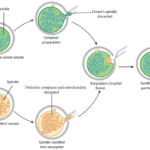+90-548-875-8000
+90-548-876-8000
Elite Hospital
North Cyprus
Follow Us on
Social Media
Prof. Shoukhrat Mitalipov, a world-renowned scientist, well-known for his ground-breaking discovering and development of next-generation IVF therapies, is now merging forces with North Cyprus IVF Center at Elite Hospital to bring new infertility treatments to our patients.
Pioneered by Prof. Mitalipov, Mitochondrial Replacement Therapy (MRT) is a groundbreaking new IVF therapy that rejuvenates poor quality eggs from infertile patients of advanced maternal age. MRT eliminates faulty mitochondria and defective cytoplasm in poor quality patient eggs and replaces it with functional mitochondria and cytoplasm taken from eggs donated by young fertile donors.
This technique allows many women who failed become pregnant after multiple conventional IVF treatment with own eggs, to conceive biological children since patient eggs are rejuvenated to make fertilization, embryo development and live birth possible.
Safety and efficacy of MRT for treatment of female infertility has been recently tested by Prof Mitalipov and his team in clinical trials. This trial was conducted on pre-selected 25 infertile families who previously underwent multiple unsuccessful IVF cycles (minimum 3 failed IVF treatments, maximum 11 failed IVF cycles). When this new therapy was initiated on these 25 families, 7 women became pregnant and after one subsequent miscarriage, 6 healthy children were born. This 28% pregnancy rate and 25% live birth rate is a remarkable improvement due to MRT, compared to a total of 159 prior conventional IVF cycles undergone by these families that resulted in no live birth. Pediatric follow-up investigations of MRT children up to 6 years of age suggested that their growth and general health is unremarkable.
Now, with joined forces from Prof. Mitalipov’s team and Dr. Ozyigit’s IVF clinic, MRT is incorporated into regular IVF cycles and offered as a therapy for infertile women of advanced age brackets at the North Cyprus IVF Center.
Since MRT rejuvenates patient’s own eggs, women must be able to produce mature eggs after ovarian stimulations and retrievals. However, many patients of 40 years and older do not produce any or produce 1 or 2 mature eggs, insufficient to induce pregnancy. Therefore, two or three ovarian stimulations maybe required in order to accumulate a sufficient number of mature oocytes to be eligible for MRT treatment.
If multiple ovarian stimulations and egg collections are necessary, egg(s) obtained after each cycle will be frozen. Once enough eggs have been accrued and stored, MRT treatment will be planned with thawed patient eggs and freshly obtained donor eggs. After MRT procedures, patient’s eggs are fertilized with partner’s sperm by ICSI, and embryos reaching blastocysts stage are frozen until later date for transfer to a patient.
The cost of this treatment modality depends on the number of ovarian stimulations and oocyte retrievals required for each individual patient. On average, a patient is expected to undergo two ovarian stimulations and oocyte retrievals, with average total cost of 14,000 Euros for the entire treatment from the beginning to the end. Thus, this estimated cost includes two rounds ovarian stimulations, oocyte retrievals and freezing, the MRT procedure and subsequent IVF, embryo culture, embryo freezing and embryo transfer.
Who is an ideal candidate for mitochondrial replacement therapy?
MRT treatment is primarily recommended for women who have experienced multiple unsuccessful IVF cycles using their own oocytes, due to poor egg quality. If these patients are not considering donor eggs, MRT is the only choice of having genetically own children.
What is the success rate of IVF treatment with mitochondrial replacement therapy?
Based on outcomes of the clinical trials conducted on limited number of families described above, live birth rate for the MRT is expected to be around 25%, meaning that 1 in 4 women may have a live birth after one cycle of MRT. This is a significant improvement considering that most patients selecting MRT treatment have already undergone multiple failed IVF cycles with their own eggs.
How long should I stay in Cyprus for this treatment?
Majority of our patients come from abroad for various fertility treatments. For our patients with a busier schedule, the preliminary work of testing and medication usage can be organized in a remote fashion. This would involve having labs done locally and sharing the results with us. With your laboratory work and scan results, we can design a treatment protocol and send you the relevant prescription. During the initial preparatory period, you will be able to use your medication and have your scans at home. You will be required to fly to Cyprus for your trigger injection and oocyte retrieval procedure. We estimate this period to be between 3 and 5 days. This would be the same for each oocyte retrieval cycle.
Once MRT has been performed and your embryos have been created, you will have a final treatment for making your endometrium receptive for embryo(s) to be transferred. On this occasion, you will be required to come to Cyprus for a total of 2 days.
Please contact us for more detail on Mitochondrial Replacement Therapy in Cyprus.
